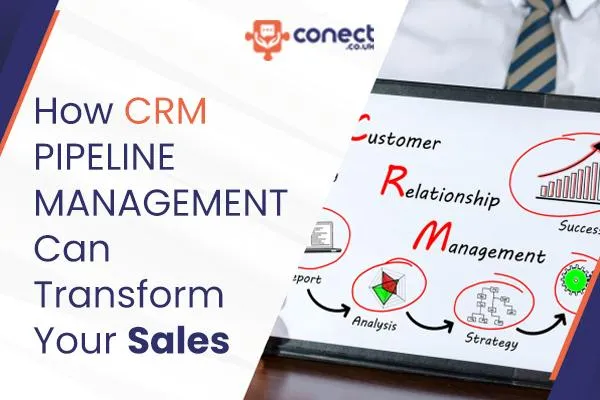
Effective CRM Pipeline Management for Sales Success
How CRM Pipeline Management Can Transform Your Sales Process
Managing customer relationships effectively is the cornerstone of any successful business. A CRM pipeline management system plays a vital role in ensuring that leads and prospects are efficiently moved through each stage of the sales funnel. By providing visibility, organization, and automation, sales Pipeline Management helps businesses maintain focus, track opportunities, and increase sales productivity. With the right CRM system, you can turn potential leads into loyal customers, ultimately driving revenue and fostering business growth.
What is CRM Pipeline Management?
CRM (Customer Relationship Management) pipeline management refers to the process of tracking and managing the different stages of customer interactions, from the first contact to the final sale. A CRM pipeline visually displays all ongoing deals, leads, and opportunities in one place, allowing sales teams to track progress and take timely action. Sales pipeline management can be broken down into several key stages:
Lead Generation: Attracting new leads and entering them into the CRM system.
Qualification: Determining which leads are most likely to convert based on specific criteria.
Proposal: Presenting an offer or proposal to the potential customer.
Closing: Finalizing the sale and turning a lead into a paying customer.
This structured approach ensures that no lead is neglected and no opportunity slips through the cracks.
How Sales Pipeline Management Improves Forecasting Accuracy
Accurate sales forecasting is crucial for business growth, and CRM pipeline management plays a key role in achieving it. By tracking leads at different stages, businesses can analyze patterns, predict revenue, and make informed decisions. A well-structured pipeline offers real-time insights into potential deals, helping sales teams focus on high-value opportunities. With accurate forecasting, businesses can allocate resources efficiently, set realistic targets, and reduce the risk of unexpected revenue fluctuations.
The Importance of CRM Pipeline Management
A robust CRM pipeline is essential for businesses aiming to increase efficiency, stay organized, and enhance customer relationships. Here's why sales process automation is a game-changer:
1. Improved Organization and Visibility
A well-organized CRM pipeline offers a clear view of the entire sales process, from initial contact to conversion. Sales teams can easily track the status of each deal, know when to follow up, and manage multiple opportunities simultaneously. This organization eliminates confusion, reduces mistakes, and ensures that no prospect is overlooked.
2. Better Lead Tracking and Management
Effective Sales pipeline management helps businesses track the journey of each lead. With features like automated follow-up reminders, lead scoring, and customizable stages, sales reps can prioritize leads based on their likelihood to convert. This ensures that sales teams are focusing their time and effort on the most promising prospects, increasing the chances of closing deals.
3. Data-Driven Decision Making
CRM systems collect valuable data on sales performance, customer interactions, and lead conversion rates. By analyzing this data, businesses can gain insights into their sales pipeline's strengths and weaknesses. For example, if leads are dropping off at a certain stage, it may indicate a problem with the sales approach, allowing teams to make adjustments to improve outcomes.
4. Faster Response Times
A CRM pipeline ensures that no lead is left behind or forgotten. Automated reminders, follow-up tasks, and real-time notifications ensure that sales teams respond quickly and efficiently to customer inquiries. This responsiveness helps build trust with prospects and increases the likelihood of conversions.
5. Build Up Communication
In a CRM pipeline, all interactions with leads are recorded in one place. This centralization allows team members to stay on the same page and ensures that no communication is lost. Whether it's a phone call, email, or meeting note, every team member has access to the same information, streamlining collaboration and preventing miscommunication.
Common Mistakes to Avoid in Sales Process Automation
Many businesses struggle with sales pipeline Management due to common mistakes that hinder efficiency. One major issue is failing to update the pipeline regularly, leading to outdated information and missed opportunities. Another mistake is overloading the pipeline with unqualified leads, which wastes time and resources. Poor communication between sales and marketing teams can also create gaps in the process. To avoid these pitfalls, businesses should ensure data accuracy, focus on high-potential leads, and align their teams for a seamless sales workflow.
How to Optimize Your Sales Pipeline Management
1. Define Clear Pipeline Stages
Every business’s sales process is unique, so it’s important to define the stages of your pipeline based on your specific needs. Common stages include lead generation, qualification, proposal, and closing. Having clear stages helps sales teams know exactly where each prospect is in the journey and what actions to take next.
2. Segment Leads Based on Value
Not all leads are created equal, so it’s essential to segment them based on their potential value. Use lead scoring or other methods to prioritize leads that are most likely to convert. By focusing on high-value prospects first, sales teams can maximize their efforts and improve their chances of closing deals.
3. Automate Repetitive Tasks
Sales pipeline management software offers automation features that can handle repetitive tasks such as sending follow-up emails, scheduling meetings, or assigning leads to sales reps. By automating these tasks, sales teams can focus on building relationships and closing deals rather than spending time on administrative work.
4. Integrate with Other Tools
Integrating your CRM with other tools like email marketing platforms, social media, or customer support systems can provide a more holistic view of customer interactions. By syncing data from multiple sources, you can gain deeper insights into customer behavior and tailor your approach to meet their needs.
5. Regularly Review and Update Your Pipeline
To ensure that your CRM pipeline stays relevant and effective, it’s essential to regularly review and update it. Look at your pipeline data to identify bottlenecks or areas where leads are stalling. You may need to tweak your sales approach, update your lead scoring system, or redefine pipeline stages to improve results.
How CRM Sales Tracking Improves Sales Efficiency
When sales teams use CRM sales tracking tools, they can prioritize their efforts, reduce the risk of losing deals, and stay organized throughout the process. For instance, if a lead is stuck in the “proposal” stage for too long, the sales team can take action, either by sending a reminder email or reaching out directly. With automation, they can follow up consistently without manual intervention, making the process more efficient.
Additionally, Sales pipeline management ensures that sales reps are equipped with all the information they need to move prospects forward. They can view past interactions, notes, and the customer’s position in the sales journey, helping them make more informed decisions and reducing the time spent searching for details.
Real-World Example: CRM Pipeline Success
A software company implemented CRM sales tracking to streamline their sales process. Before the system, their sales team struggled to keep track of leads, often missing follow-ups or losing prospects during the qualification stage. After adopting a CRM, they saw a 35% increase in closed deals within six months. The system allowed them to automate follow-ups, prioritize high-value leads, and better organize their pipeline, leading to faster conversions and improved customer relationships.
Conclusion
Effective CRM pipeline management is the key to a more organized, efficient, and data-driven sales process. By clearly defining pipeline stages, automating tasks, and analyzing performance, businesses can significantly improve their lead conversion rates and customer relationships. Whether you’re a small startup or a large enterprise, implementing a CRM system that tracks and optimizes your sales pipeline will ultimately drive business growth.
If your sales team isn't utilizing CRM sales tracking yet, it's time to start optimizing your processes and unlocking the full potential of your customer relationships.
FAQs
1. What is CRM pipeline management?
Sales process automation is the process of tracking and managing the stages of customer interactions, helping businesses convert leads into customers efficiently.
2. How can Sales process automation boost sales?
By organizing leads, automating tasks, and providing insights into sales performance, sales process automation enables sales teams to work more efficiently and close more deals.
3. Can Sales Process Automation help with customer retention?
Yes, it helps sales teams stay organized and engaged with leads and customers, improving the chances of building long-term relationships and retaining clients.
4. How do I set up CRM pipeline stages?
Define your stages based on your sales process. Common stages include lead generation, qualification, proposal, and closing. Customize them to fit your business needs.
5. What are some popular CRM tools for pipeline management?
Some widely-used CRM tools include Salesforce, HubSpot, Zoho CRM, and Pipedrive. Each offers features to help businesses manage and optimize their sales pipeline effectively.
6. Can I integrate my CRM with other tools?
Yes, most CRM systems offer integrations with email marketing platforms, social media tools, customer support systems, and more, providing a comprehensive view of your customer interactions.
7. How can sales process automation help with lead prioritization?
CRM tools often include lead scoring, which helps businesses identify and focus on the most promising leads, ensuring that sales teams work on the highest-value opportunities first.
8. How can I measure the effectiveness of my CRM pipeline?
You can measure effectiveness by tracking key metrics like conversion rates, sales cycle length, lead velocity, and win rates. Regular analysis of these metrics will help you refine your process.
9. Is sales process automation suitable for small businesses?
Yes, Sales process automation is especially valuable for small businesses as it helps streamline operations, improves sales team efficiency, and provides a clear overview of leads and opportunities.
10. How often should I update my CRM pipeline?
It's important to review and update your CRM pipeline regularly, ideally weekly or monthly, to ensure your sales process remains relevant, and to address any bottlenecks or opportunities for improvement.

The All-In-One Solution to grow your business. Capture Free Leads And Conversationally Covert Them Into Customers!
Contact information
Address : Layton Lane, Rawdon, Leeds, LS19 6RG
Phone : +44 7859 775480
Email : [email protected]
© 2025 Butterfly Effect Marketing Ltd - All Rights Reserved.

